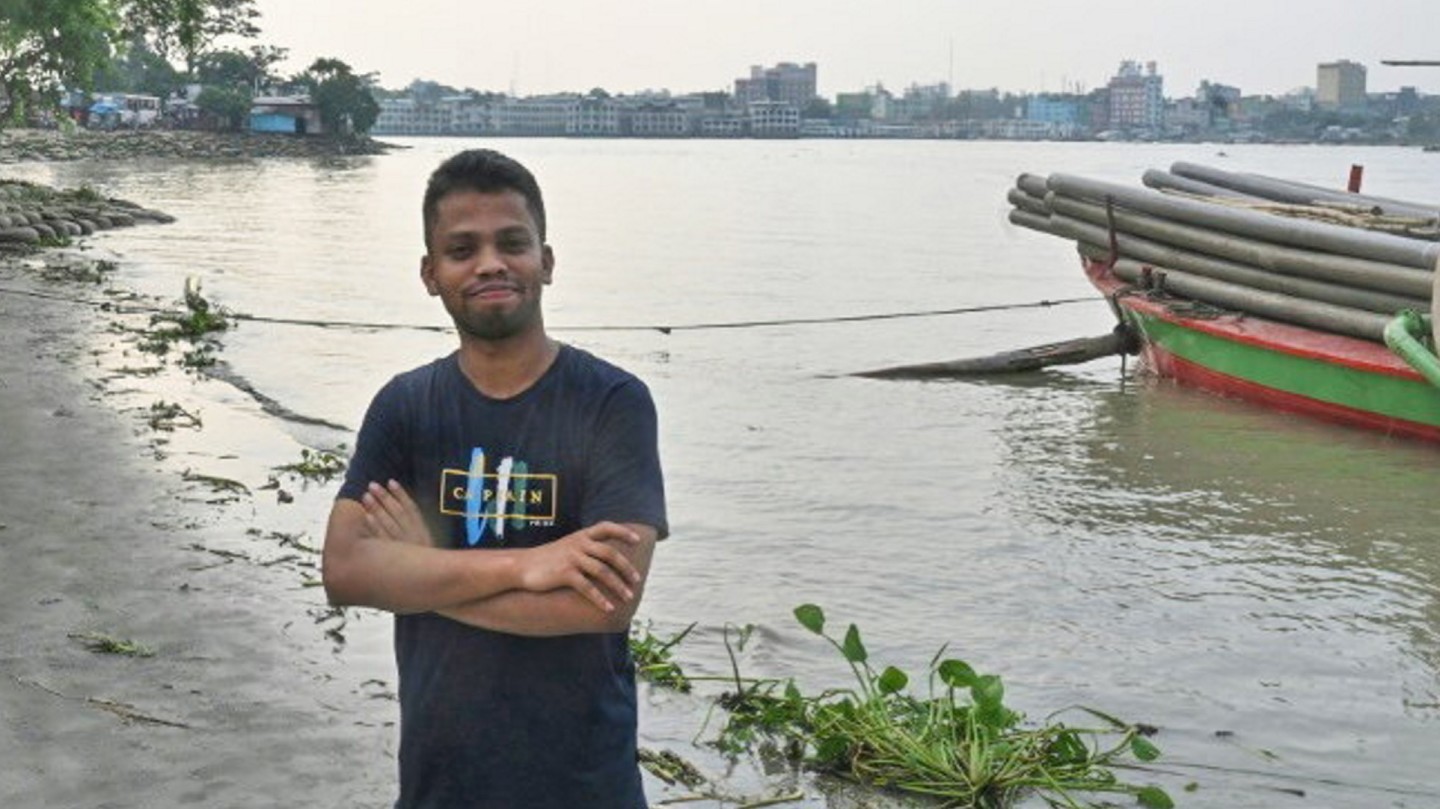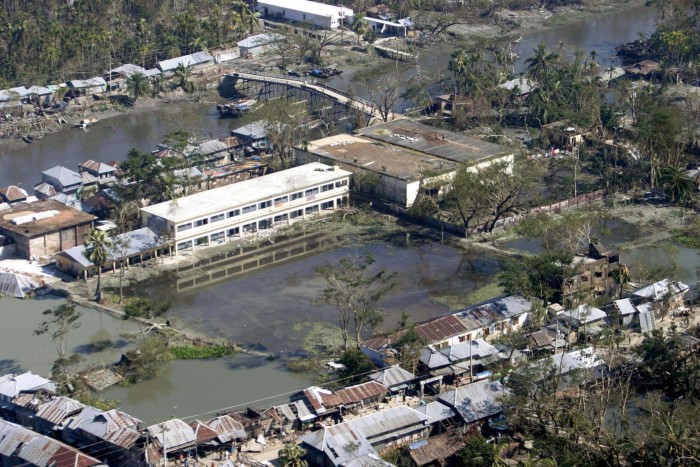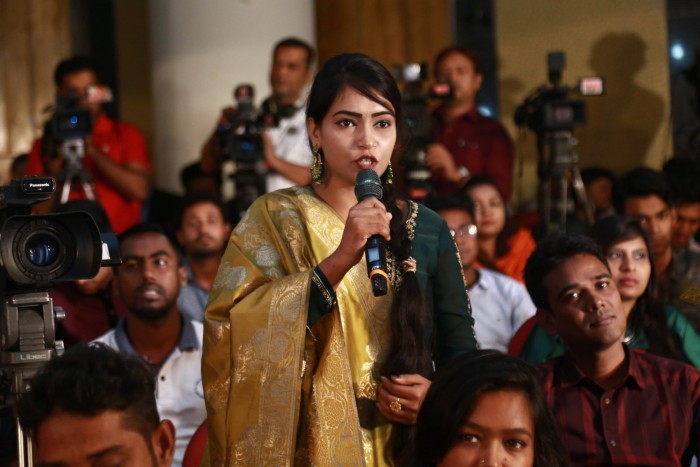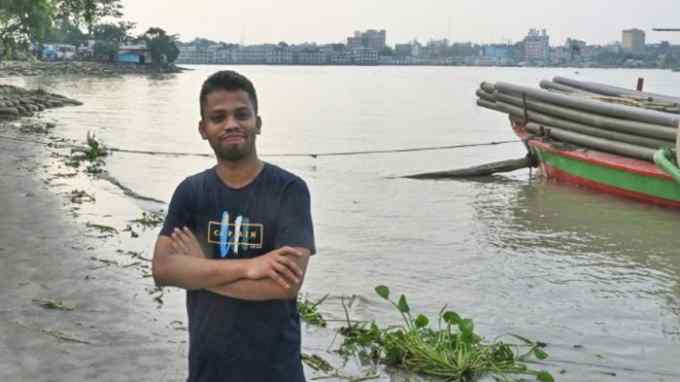Bangladeshi youth activists rally against carbon

Simply sign up to the Climate change myFT Digest -- delivered directly to your inbox.
Shakila Islam, a 28-year-old student at Jahangirnagar University, recalls the terrifying night in 2007 when, aged 12, she huddled with her family in the kitchen of their small house in Barisal, Bangladesh, as Cyclone Sidr raged outside.
Winds of up to 120mph left a trail of devastation and traumatised young people, such as Islam. Sixteen years later, Islam — and others of her generation who have witnessed terrifying natural disasters — are running YouthNet for Climate Justice, a networking platform supporting youth-led initiatives on climate policy.
The project, which aims to amplify young voices from coastal areas and increase their engagement at local, regional and national levels, was founded in 2016 by Islam and fellow activist Sohanur Rahman, with minimal funding from government.
According to the humanitarian Red Crescent Society, Cyclone Sidr affected approximately 8.9mn people and was the strongest cyclone to hit the country since 1991, when more than 143,000 people were killed. Sidr destroyed homes, livelihoods and displaced people. Islam and her family had to migrate to the country’s capital, Dhaka.
“It was the longest night of my life,” she says. “My little brother wouldn’t stop crying and my grandmother prayed to God to save us. I didn’t know why it was happening, what had we done wrong. It was years later I realised it wasn’t our fault, we were the victims of climate change.”

YouthNet caught the attention of Bangladesh’s foreign minister, Dr AK Abdul Momen, who set up the “Delta Fund” in 2020 to promote the role of young people in building greater resilience amid the climate emergency.
“Nineteen coastal districts attended the launch of our Coastal Youth Action Hub in 2017, and [Dr Momen] was a guest speaker,” recalls Islam, co-ordinator of YouthNet, which is the largest such advocacy project in Bangladesh. “It was a good sign the government wanted to work with us.”
“Our climate activism began with the help of our families,” she adds. “My father set us up in our house and later YouthNet organised the first youth conference on climate change in 2017, partnering with the government’s environment department and Unicef — 1,000 young people from coastal areas attended.”

Lying on the banks of the river Kirtonkhola, Barisal is a large coastal city with stunning architectural sites, shimmering lakes such as the Durga Sagar, and a floating guava market. But this seemingly tranquil location is vulnerable to devastating cyclones and extreme flooding.
In response, the city’s youth have organised rallies, demonstrations and campaigns demanding that the Bangladeshi government take action on climate change. In 2017, the platform presented a youth declaration to an all-party parliamentary group on climate change, calling for increased youth engagement for a cleaner and greener country.
YouthNet has also been instrumental in involving young people in protests demanding more action on the Paris accord, the international treaty on climate change adopted in 2015.
Rahman, who is also chief executive of the Bangladesh Model Youth Parliament, was motivated by another welfare issue that came to light after outreach work found a link between climate change disasters and child marriages.
“Displaced families responded with a negative coping mechanism: marrying girls off at a young age means one less mouth to feed and body to shelter,” explains Rahman. “I saw how climate change is beyond just the loss of property and land — it impacts human rights. I had to act.”
In 2018, YouthNet won the Joy Bangla Youth Award in recognition of its climate change activism. “Just because we won an award, we were not going to stop,” says Islam.
“We joined the first global climate strike expressing solidarity with Greta Thunberg and the Fridays for Future movement.” YouthNet wanted to go further and “hold the global community accountable for climate action and support communities like ours”.
For example, the network of young activists staged demonstrations in Dhaka against a coal-powered plant in Matarbari that was being developed by the government and Japanese investors. Eventually, Japan pulled funding from the projects in Matarbari and Cox’s Bazar, and the government rejected 16 out of the 21 proposed plants across the country.
“The fight against climate change comes with financial consequences for young activists,” Islam says. “Although we participated in the National Adaptation Plan formulation process and the Delta conference to enhance youth participation, YouthNet was unable to fulfil the government’s funding criteria as we don’t have the bank balance to register as an NGO.”
But, with support from the COP26 Youth Engagement Challenge Fund and ActionAid Bangladesh, YouthNet has mobilised 2,000 activists and supported 50,000 people from 40 climate-vulnerable districts. The network continues to help people adapt to the crisis because “it is not possible for everyone to migrate from coastal areas affected by climate disasters,” notes Islam.
While YouthNet has received some limited government funding through its partnership with Climate Parliament Bangladesh, the organisation still faces a steep challenge to realise its ambitions. It has, however, opened up new conversations with Bangladesh’s decision makers.
YouthNet says it is not against business, just irresponsible business. Rahman argues that, to change the narrative, it is necessary to change the narrator, to ensure young people’s voices are heard. “No more sidelining children in decisions affecting their lives”, he tweeted recently. “Their protection shouldn’t be compromised when they fight for their rights and future!”
Climate Capital

Where climate change meets business, markets and politics. Explore the FT’s coverage here.
Are you curious about the FT’s environmental sustainability commitments? Find out more about our science-based targets here

Comments